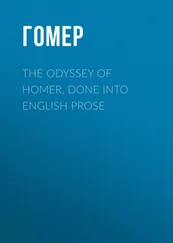Alexander Poleshchuk - The Secret of Homer
Здесь есть возможность читать онлайн «Alexander Poleshchuk - The Secret of Homer» весь текст электронной книги совершенно бесплатно (целиком полную версию без сокращений). В некоторых случаях можно слушать аудио, скачать через торрент в формате fb2 и присутствует краткое содержание. Город: Moscow, Год выпуска: 1968, Издательство: MIR Publishers, Жанр: Фантастика и фэнтези, на английском языке. Описание произведения, (предисловие) а так же отзывы посетителей доступны на портале библиотеки ЛибКат.
- Название:The Secret of Homer
- Автор:
- Издательство:MIR Publishers
- Жанр:
- Год:1968
- Город:Moscow
- ISBN:нет данных
- Рейтинг книги:4 / 5. Голосов: 1
-
Избранное:Добавить в избранное
- Отзывы:
-
Ваша оценка:
- 80
- 1
- 2
- 3
- 4
- 5
The Secret of Homer: краткое содержание, описание и аннотация
Предлагаем к чтению аннотацию, описание, краткое содержание или предисловие (зависит от того, что написал сам автор книги «The Secret of Homer»). Если вы не нашли необходимую информацию о книге — напишите в комментариях, мы постараемся отыскать её.
The Secret of Homer — читать онлайн бесплатно полную книгу (весь текст) целиком
Ниже представлен текст книги, разбитый по страницам. Система сохранения места последней прочитанной страницы, позволяет с удобством читать онлайн бесплатно книгу «The Secret of Homer», без необходимости каждый раз заново искать на чём Вы остановились. Поставьте закладку, и сможете в любой момент перейти на страницу, на которой закончили чтение.
Интервал:
Закладка:
Alexander Poleshchuk
THE SECRET OF HOMER
To this day I can't make out how it happened, and I've never been in such a state of mental confusion. It all began during the last session of the Moscow Society of Lovers of Classical Literature. At the meeting there was a stranger who came up to me afterwards, introduced himself, and asked me to visit his school. "I'm worried about my boys," he said. "Technology, mathematics, and physics have absorbed all their interests. I'd like to inject a fresh stream into their education."
I accepted his invitation and have not regretted it. The senior pupils-boys of sixteen and seventeen-greeted me warily and after the first lesson one of them asked me point-blank, "Have they sent you to cure us of our technical 'abscess'? "
"No," I answered. "But didn't you find what I was talking about interesting?"
"Not bad," answered someone sitting on the window-sill, "Not bad so far."
But, as I knew quite well they were still only boys and when the hexameters of the ancient myths resounded in the snug classroom, the eyes of these self-confident adolescents lit up with enthusiasm and curiosity. I must admit that in my work with students reading philology and history I've never encountered such attention and such interest. What apparently was a duty for arts students was a marvellous fairy-tale for these lads.
I came to them once a week, and every time they astonished me with their freshness of perception and their remarkable memory. And only one of them-the tallest and probably the strongest lad who sat in the second row and beat time to rhythm of the verses with his brawny arm thrown over the back of the chair-never asked me any questions. Sometimes I put a question to him myself but his answers were laconic and monosyllabic.
"You talk like a Spartan," I said to him once, and that, perhaps, was my first mistake.
A month passed, and another. The boys I knew were working hard at their favourite subject, and had nearly finished assembling an extremely complicated apparatus something like "time machine". My lessons were only a kind of "pedagogical adjunct", so I was quite literally thunderstruck when the taciturn lad suddenly stopped beating time during one of my talks and said, "The stress. It's wrong. Your…"
"Come now," I said. "The stress in this word only changed during the Roman Empire. Have you started learning ancient Greek?"
"He's learnt it already," said one of the boys.
"Is that true?" I asked.
"Oh no. I just read the textbook you were talking about. That's all."
"Don't believe him," said a chorus of voices. "Artem knows the 'Iliad' by heart."
"Is that true, Artem?"
"Well, yes."
I asked him a number of questions. Choosing his words without difficulty, Artem answered me in the language of Homer. His pronunciation was not perfect, but that fault could be easily eliminated.
Then, about ten days ago, Artem and I had an argument. We had just been reading the place in the "Aethiopis", that tells how Achilles, having mortally wounded Penthesilea, the queen of the Amazons, divests her of her helmet, his trophy by right of victory, and suddenly, struck by her beauty, falls in love with the dying woman.
"It is thought that Arctinus of Miletus, the author of this poem, was a pupil of Homer's," I remarked.
"I don't doubt it," said Artem. "What a scene!"
"Smashing!" said one of the boys.
"Really, friends," I said, turning to the whole class, "can't you find a better sounding expression than 'smashing'?"
"Emotion does not always dictate euphonious expressions. You know that better than anybody else," returned Artem.
"But such masterpieces as the 'Aethiopis', the 'Iliad'…"
"In expurgated translations-yes. Homer's heroes are live people. Sometimes tender, sometimes stern, but they always have a ready tongue. Achilles shouts at Agamemnon: 'You sot, you son of a bitch!', but the translator hums and haws and thinks up idiotic words-'Wine-bibber! Dog-like man!' And how Zeus abuses Hera!"
Artem gave a short laugh.
"That's where Homer is great," he continued. "In everything an artist, in everything a poet. Anyone else would have started the story of the Trojan War with Adam, but Homer plunges straight into what is most important and most vivid:
"Of Peleus' son, Achilles, sing, O Muse,
The vengeance, deep and deadly; whence to Greece
Unnumbered ills arose."
"Perhaps you are right," I began carefully, approaching the subject of that day's lesson-"the Homeric Question", "but the whole point is that Homer never existed…"
"What do you mean-never existed. That can't be!" cried the lads.
"No, Homer never was. There was a collective creator-hundreds of bards who clothed the original nucleus of the legend in a poem of surpassing beauty."
"Is that absolutely certain?" asked Artem.
"Absolutely and I personally hold the same opinion. In the seventeenth century the Abbe d'Aubigniac expressed doubts about the existence of Homer, pointing out a large number of contradictions, and since then the research carried out by Grote and Hermann, and before them by Wolf, has confirmed this completely. There had been arguments about it before in fact, but opinion of Aristarchus that Homer created the 'Iliad' in his youth and the 'Odyssey' much later, in his old age, prevailed."
"But the ancients did believe Homer existed?" persisted Artem.
"The ancients did not know the analytical method developed in the middle of the nineteenth century."
"In questions like this you have to integrate," someone remarked.
"What did you say? Integrate?" said I, laughing. "Technical terms again in a lesson in the humanities?"
"Don't be angry," said Artem in conciliatory tones. "But it's difficult for me and my comrades to believe that Homer never existed. The question must be gone into."
"Do you know, boys," I said, "how the ancients viewed this question? Seven towns disputed the honour of being the birthplace of the poet, and an ancient quatrain has come down to us:
'Attempt not to discover, where Homer was born, and who he was;
All cities proudly claim to be his birthplace;
the spirit is all, not the place;
The birthplace of the poet was the glory of the
'Iliad', the story of Odysseus.'
Nor is that all. Homer was thought to be the son of Apollo and the Muse Calliope, he was called a native of Chios, Lydia, Cyprus, Thessaly, Luca, Rhodes, and Rome; and even a descendant of Odysseus himself, the son of Telemachus and Polycasta, daughter of Nestor."
"Warm!" cried Artem suddenly. "Warm! That last one's the theory to be checked. It's no accident that Odysseus occupies such an important place in both the 'Iliad' and the 'Odyssey'. There were special reasons that impelled the ancient bard…"
"Or ancient bards," I hastened to add.
"No, the ancient bard to make Odysseus the central figure in the second epic. Any way, the only song of the 'Iliad' that is not directly connected with the subject-the wrath of Achilles and its consequences-tells of the adventures of Odysseus."
"You mean the 'Dolonia'?" I asked.
"I'm speaking of the song in which Odysseus and Diomedes go scouting and kill the Trojan spy-"
"They kill Dolon the spy and so the song has been called 'Dolonia' by the experts. But what follows from that?"
"There was some connection between Homer and Odysseus. That's what follows."
"As a matter of fact, the archaeologist Schliemann who got permission from the Turkish government to 'excavate ancient Troy, had no doubts at all about the existence of Odysseus. On the island of Ithaca, of which Odysseus was king, Schliemann discovered the remains of the stump of an old olive-tree among some stone ruins. You remember how to test Odysseus, his wife Penelope, ordered her servant Eurycleia to carry her husband's bed outside, and the angry Odysseus said:
Читать дальшеИнтервал:
Закладка:
Похожие книги на «The Secret of Homer»
Представляем Вашему вниманию похожие книги на «The Secret of Homer» списком для выбора. Мы отобрали схожую по названию и смыслу литературу в надежде предоставить читателям больше вариантов отыскать новые, интересные, ещё непрочитанные произведения.
Обсуждение, отзывы о книге «The Secret of Homer» и просто собственные мнения читателей. Оставьте ваши комментарии, напишите, что Вы думаете о произведении, его смысле или главных героях. Укажите что конкретно понравилось, а что нет, и почему Вы так считаете.












